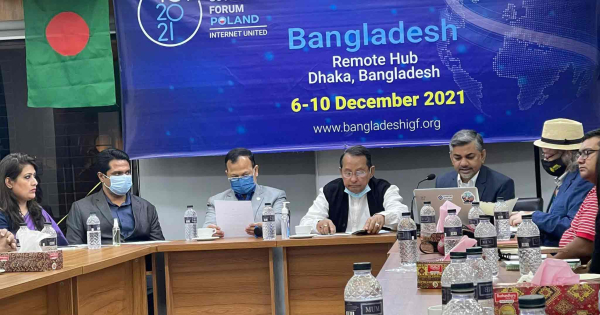Bangladesh Remote Hub-UNIGF 2021 Ended
Desk Report
প্রকাশিত: ১২:০৩ পিএম, ১১ ডিসেম্বর ২০২১ শনিবার আপডেট: ০১:৩৩ পিএম, ১১ ডিসেম্বর ২০২১ শনিবার

Internet Governance Forum 2021 was organized at International Congress Center in Katowice in Poland from December 6-10, 2021. Bangladesh Internet Governance Forum has organized an IGF Bangladesh Remote Hub in Dhaka in cooperation with United Nations Development Program (UNDP). The Bangladesh Remote Hub created an opportunity for exceptionally interesting discussions and good decisions for the participants’ attended across the country. BIGF considered the Remote Hub in Bangladesh as an opportunity for building capacity, especially for youth and other professionals on the issue. The Bangladesh Remote Hub was organized from 7 to 10 December 2021 from 2:00 pm to 9 pm for around 145 participants who attended the sessions. A total of 37 Remote Hubs took part from across the globe. Bangladesh Remote Hub was selected 30 issues and sessions. The participants of Bangladesh Remote Hub provided their feedback in the session and took part in the question-answer sessions.
Bangladesh Internet Governance Forum (BIGF) works in conjunction with the United Nations Internet Governance Forum (UNIGF). It is a multi-stakeholder platform to engage in Internet governance-related issues.
A closing session was held on 10 December Mr. Hasanul Haq Inu, MP, Chairperson, Bangladesh Internet Governance Forum & Chairman Parliamentary Standing Committee, Ministry of Information and Broadcasting and Former, Minister on Ministry of Information was present Chief Guest and Brigadier General Md. Nasim Parvez, NDC, Director General, Systems and Services, Bangladesh Telecommunication Regulatory Commission (BTRC) was present as the Special Guest.
Mohammad Abdul Haque Anu, Secretary-General, Bangladesh Internet Governance Forum briefed about the background of BIGF and highlighted some of the interventions of BIGF in the previous years. BIGF brings together all stakeholders especially youths in the Internet governance issues, digital divide and discrimination, connectivity for the rural youths whether they represent governments, the private sector or civil society, including the technical and academic community, on an equal basis and through an open and inclusive sustainable and trusted internet process.
AHM Bazlur Rahman, Chief Executive Officer, Bangladesh NGOs Network for Radio and Communication (BNNRC) mentioned that BIGF has been working with the government to accelerate the activities with the government and international level for knowledge creation, knowledge preservation, knowledge dissemination. BIGF has been organizing Youth Internet Governance Forum, School of Internet Governance and this year we will organize Women Internet Governance Forum, Children Internet Governance Forum for amplifying their voices through and reducing the digital divide by influencing policy-makers.
Dr. Ramiz Uddin, Head of Experimentation, UNDP Accelerator Lab, spoke in the session and emphasized removing the digital divide and gearing up all initiatives of the government undertaken for Leave No One Behind. The government has planned to bring all the civic amenities of the city to the villages. Under this initiative 'My Village, My City', many aims like road connectivity, internet connection, telecommunication, health center, drainage and waste management have been set up. As promised in the election manifesto of the government, if the facilities of the city are expanded to the villages and rural youth and agri-entrepreneurs are brought under training, productive employment opportunities could help people in rural areas get basic government benefits equally.
Brigadier General Md. Nasim Parvez, NDC (Director General, Systems and Services of BTRC, in his speech mentioned some initiatives have been undertaken like fixing the maximum tariff for broadband internet connection. A customer now has to pay Tk 500 a month for using a broadband connection with a minimum internet speed of 5 Mbps. For 10 Mbps, the rate is Tk 800 to Tk 1,000, and for 20 Mbps, Tk 1,100 to Tk 1,200. BTRC fixed the tariff after a series of meetings with operators of the International Internet Gateway, Nationwide Telecommunication Transmission Network, International Terrestrial Cable, and internet service providers as part of the "One Country One Rate". He said the BTRC introduced the "One Country One Rate" tariff to attract foreign investment by boosting coordination among ISPs at the local level and protecting the interests of marginal broadband internet subscribers. Although the number of mobile internet users, in general, is high, broadband internet users use 58 percent of the country's total bandwidth.
BTRC has been implementing the projects for Establishment of Broadband Connectivity in Telecommunication Disadvantaged Areas (Connected Bangladesh), Digitization of government primary school education system in disadvantaged remote areas, Expansion for Telecommunications, Mobile Technology and Internet-Based Digital Postal Services in Remote, Coastal, Haor and Hill Areas, Satellite network project in the island area, Establishment of High-Speed Mobile Broadband Networks in Haor and Islands, Telecommunication Expansion Project for Disadvantaged People in Haor, Baor and Remote Areas, Bangabandhu Satellite-1 Telecommunication Connection Project in various towns and villages in remote, inaccessible and coastal areas of Bangladesh. These initiatives will ensure connectivity to the furthest corner of Bangladesh.
Chief Guest Hasanul Haq Inu, MP, Chairperson, Bangladesh Internet Governance Forum & Chairman Parliamentary Standing Committee on Ministry of Information & Broadcasting mentioned that we need a Digitally Sustainable Plan and a Digital human rights plan. The plan is to bring in a new system. To build an inclusive digital society and economy for all, the Internet must be Cybersecurity provisions, to ensure human rights is an effective tool to ensure the rights of entrepreneurs in the digital market. With these policy issues in mind, some steps need to be taken on an urgent basis to make the developing digital society of the country faster and more effective. Recognition of the Internet as a fundamental right; Implementation as a fundamental right demands time. Ensuring affordable high-speed internet connection on an urgent basis. Withdraw all taxes on Android phones to ensure affordable smartphones as well as Android phones to reduce digital inequality.
